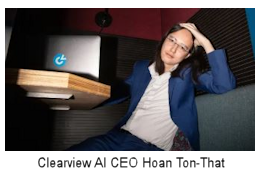Clearview
AI Facial Recognition Unmasked - Leaked to News Outlets
Scraping Internet Images Controversy Continues - Hacked Data Leaked?
Website States: For Law Enforcement Use Only
'Clearview's Facial Recognition Used By DOJ, ICE, Macy’s, Kohl's, Walmart,
& The NBA'
 A
BuzzFeed News review of Clearview AI documents has revealed: company working
with more than 2,200 law enforcement agencies, companies, and individuals around
the world
A
BuzzFeed News review of Clearview AI documents has revealed: company working
with more than 2,200 law enforcement agencies, companies, and individuals around
the world
The United States’ main immigration enforcement agency, the Department of
Justice, retailers including Best Buy and Macy’s, and a sovereign wealth fund in
the United Arab Emirates are among the thousands of government entities and
private businesses around the world listed as clients of the controversial
facial recognition startup with a database of billions of photos scraped from
social media and the web.
The startup, Clearview AI, is facing legal threats from Facebook, Google, and
Twitter, as well as calls for regulation and scrutiny in the US. But new
documents reviewed by BuzzFeed News reveal that it has already shared or sold
its technology to thousands of organizations around the world.
 In
its quest to create a global biometric identification system to span both
public and private sectors, Clearview has signed paid contracts with US
Immigration and Customs Enforcement (ICE), the US Attorney's Office for the
Southern District of New York, and Macy’s, according to the document obtained by
BuzzFeed News. The company has credentialed users at the FBI, Customs and Border
Protection (CBP), Interpol, and hundreds of local police departments. In doing
so, Clearview has taken a flood-the-zone approach to seeking out new clients,
providing access not just to organizations, but to individuals within those
organizations — sometimes with little or no oversight or awareness from their
own management.
In
its quest to create a global biometric identification system to span both
public and private sectors, Clearview has signed paid contracts with US
Immigration and Customs Enforcement (ICE), the US Attorney's Office for the
Southern District of New York, and Macy’s, according to the document obtained by
BuzzFeed News. The company has credentialed users at the FBI, Customs and Border
Protection (CBP), Interpol, and hundreds of local police departments. In doing
so, Clearview has taken a flood-the-zone approach to seeking out new clients,
providing access not just to organizations, but to individuals within those
organizations — sometimes with little or no oversight or awareness from their
own management.
Kohl's with 2,000 searches and Macy's with 6,000 searches are among the
private companies with the most searches.
Clearview’s software, which claims to match photos of persons of interest to
online images culled from millions of sites, has been used by people in
more than 2,200 law enforcement departments, government agencies, and companies
across 27 countries, according to the documents. This data provides the most
complete picture to date of who has used the controversial technology and
reveals what some observers have previously feared: Clearview AI’s facial
recognition has been deployed at every level of American society and is
making its way around the world.
&uuid=(email)) The
New York–based startup has claimed its controversial technology is intended
as a tool for police and that it was prioritizing business in North America.
“It’s strictly for law enforcement,” Clearview CEO
Hoan
Ton-That said on Fox Business earlier this month. He noted in a Feb. 5
statement to BuzzFeed News that his company was “focused on doing
business in USA and Canada.” But in reality, Clearview AI has also been
aggressively pursuing clients in industries such as law, retail, banking, and
gaming and pushing into international markets in Europe, South America, Asia
Pacific, and the Middle East.
The
New York–based startup has claimed its controversial technology is intended
as a tool for police and that it was prioritizing business in North America.
“It’s strictly for law enforcement,” Clearview CEO
Hoan
Ton-That said on Fox Business earlier this month. He noted in a Feb. 5
statement to BuzzFeed News that his company was “focused on doing
business in USA and Canada.” But in reality, Clearview AI has also been
aggressively pursuing clients in industries such as law, retail, banking, and
gaming and pushing into international markets in Europe, South America, Asia
Pacific, and the Middle East.
In reply to an extensive list of questions, Clearview attorney Tor Ekeland said,
"There are numerous inaccuracies in this illegally obtained information.
As there is an ongoing Federal investigation, we have no further comment."
Clearview has attracted a whirlwind of attention for claiming it had built
unprecedented facial recognition trained on an ever-increasing database of more
than 3 billion photos ripped from Facebook, Instagram, YouTube, and other
websites. In a January interview with
the New York Times, Ton-That said the company was working with 600 law
enforcement agencies across the country and had provided the software, which can
be used on a desktop computer or through a mobile app, to the FBI and Department
of Homeland Security.
The internal documents, which were uncovered by a source who declined to be
named for fear of retribution from the company or the government agencies named
in them, detail just how far Clearview has been able to distribute its
technology, providing it to people everywhere, from college security departments
to attorneys general offices, and in countries from Australia to Saudi Arabia.
BuzzFeed News authenticated the logs
“This is completely crazy,” Clare Garvie, a senior associate at the Center on
Privacy and Technology at Georgetown Law School, told BuzzFeed News. “Here’s why
it’s concerning to me: There is no clear line between who is permitted access
to this incredibly powerful and incredibly risky tool and who doesn’t have
access. There is not a clear line between law enforcement and non-law
enforcement.”
Jacinta González, a senior campaign director at Mijente, a Latinx advocacy group
told BuzzFeed News that ICE’s use of Clearview in the absence of a regulatory
framework is troubling. “This tool goes way beyond anything that is legal,
and there is literally no accountability for how they're going to use this
tool,” she said. “They could walk into a supermarket, scan people, see if it
matches up, and deport them immediately.”
More than 200 companies have Clearview accounts, according to the
documents, including major stores like Kohl’s and Walmart and banks like
Wells Fargo and Bank of America. While some of these entities have formal
contracts with Clearview, the majority — as with public sector entities — appear
to have only used the facial recognition software on free trials.
For a company that maintains its tools are for law enforcement, Clearview’s
client list includes a startling number of private companies in industries like
entertainment (Madison Square Garden and Eventbrite), gaming (Las Vegas Sands
and Pechanga Resort Casino), sports (the NBA), fitness (Equinox), and even
cryptocurrency (Coinbase).
Employees at big-box retailers, supermarkets, pharmacy chains, and department
stores have also trialed Clearview. Company logs reviewed by BuzzFeed News
include Walmart (nearly 300 searches), Best Buy (more than 200 searches), grocer
Albertsons (more than 40 searches), and Rite Aid (about 35 searches). Kohl’s,
which has run more than 2,000 searches across 11 different accounts, and Macy’s,
a paying customer that has completed more than 6,000, are among the private
companies with the most searches.
Employees at mobile carriers like AT&T, Verizon, and T-Mobile also appear in the
Clearview documents. None of these companies appear to be paying customers, but
their employees are listed as having collectively run hundreds of Clearview
searches. AT&T, which searched for some 200 people, confirmed to BuzzFeed News
that the company did not pay for the service, but declined further comment.
Clearview’s code of conduct states that individual users must be “authorized by
their employer” to use the tool, but that seems to be more of a guiding
principle than an enforceable rule. Clearview’s documents show that at
Home Depot, five accounts ran nearly 100 searches.
“We don’t use Clearview AI,” a Home Depot representative told BuzzFeed
News when asked for comment. “Curious why you thought we’re a client.”
Garvie was alarmed by Clearview’s application to retail settings, noting that it
could lead to the profiling of customers for shoplifting or theft.
“That to me is a concerning premise because not only is there a complete
absence of transparency into who gets suspected of shoplifting, and whether
there’s any redress provided to an individual,” she said.
buzzfeednews.com
theverge.com
Editor's Note: Good that it’s being ‘unmasked’, as scraping images is
just a completely invasive process with no boundaries, consent, approval, or
deletions. Which could lead to an overreaction in Congress.
And while the privacy advocates are even questioning the mainstream ethical
approach currently used by the prevailing solution providers, this process of
unbridled mass identification and matching will eventually lead to potentially
overregulation. Especially given the misrepresentations Clearview's made to the
industry.
Sure, it's growing rapidly and is widely popular, but consider the fact that it
completely eliminates privacy - completely. This is not just a step on that
slippery slop, it's a leap down the slope. Just a thought that may not be very
popular. - Gus Downing